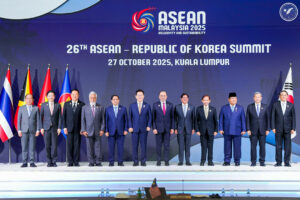ASEAN, South Korea launch FTA upgrade talks

By Chloe Mari A. Hufana, Reporter
KUALA LUMPUR — Philippine President Ferdinand R. Marcos, Jr. on Monday pushed for an expanded free trade deal between the Association of Southeast Asian Nations (ASEAN) and South Korea, saying this would keep markets open and counter growing protectionist trends in the global economy.
Mr. Marcos said a review of the ASEAN-Korea Free Trade Agreement (AKFTA) marks a “shared determination” to ensure the partnership remains relevant amid global economic uncertainty.
“The Philippines welcomes the launch of the negotiations to upgrade the ASEAN-Korea Free Trade Area, a timely step in strengthening ASEAN-Korea economic ties and ensuring that our partnership remains relevant in today’s rapidly changing global economy,” he said during the 26th ASEAN-Republic of Korea Summit in Kuala Lumpur.
The President added that enhancing the trade pact would reaffirm both sides’ commitment to transparency, fairness and cooperation in trade.
Trade between ASEAN and South Korea reached $187.1 billion in 2023, according to the South Korean Ministry of Foreign Affairs.
Seoul is the regional bloc’s second-largest trading partner, while ASEAN is South Korea’s second-largest investment destination, with foreign direct investment inflows reaching $10.8 billion in 2022 and $7.31 billion in 2023.
ASEAN Studies lecturer at De La Salle-College of St. Benilde Josue Raphael J. Cortez said the review of the AKFTA underscores the need for trade partnerships to adapt to current geoeconomic challenges.
As ASEAN’s second-largest trading partner, South Korea plays a key role in ensuring mutual economic resilience amid global shifts, he noted.
“This strengthening of partnership is undoubtedly a win-win situation, especially since trade diversification is not an alternative anymore today, but is an imperative that every nation-state must embrace,” he said via Facebook Messenger.
If realized, the upgraded FTA would boost trade in agriculture and machinery, enhance tourism-driven growth, and attract more South Korean investments to the region, he added.
For the Philippines, the deal could strengthen its electronics exports and provide alternative sources of oil, petroleum, and agricultural goods, supporting both energy stability and food security, Mr. Cortez noted.
RCEP
During the 5th Regional Comprehensive Economic Partnership (RCEP) Leaders’ Summit on Monday, Mr. Marcos urged the member states to accelerate the accession process to expand the bloc’s membership and ensure that businesses, especially micro, small, and medium enterprises (MSMEs), fully benefit from the world’s largest free trade agreement.
He noted that early expansion would deepen regional integration, reinforce supply-chain resilience, and reaffirm ASEAN’s central role in shaping Asia’s economic future.
“It is in our collective interest to advance the accession process without delay,” Mr. Marcos said.
The RCEP brings together the ASEAN member states along with China, Japan, South Korea, Australia and New Zealand, covering nearly a third of global gross domestic product (GDP) and trade.
“RCEP exemplifies ASEAN’s commitment to a rules-based trading system — our strongest anchor amid today’s global uncertainties,” the Philippine president said.
“It provides a stable and predictable framework for trade and investments, allowing our economies to grow and develop together in an environment of trust, fairness, and transparency.”
Mr. Marcos called on all RCEP parties to enhance cooperation on awareness-building and capacity development, enabling MSMEs to utilize the pact’s benefits better.
He added that Manila is ready to collaborate with other members on a regional campaign to promote the pact and facilitate dialogue, business matching and cross-border collaboration.
“To further demonstrate our commitment, the Philippines will be pleased to host this International Trade Forum in November next year,” he said.
The President also underscored the need for RCEP to evolve with global trends, highlighting the importance of cooperation in digital trade, the creative economy, green transition, and innovation.
According to Mr. Cortez, the President’s remarks highlighted the Philippines’ openness to collaborate with other nations and underscore the importance of multilateral approaches to today’s economic challenges.
He noted the regional trade pact offers a framework for both developed and developing members to protect their economic interests amid global market volatility and geopolitical uncertainty.
“One has to bear in mind that trade is not merely affected by skyrocketing tariffs, but also political and armed conflicts. With every part of the world today seemingly challenged by political uncertainty, trade disruptions are inevitable,” Mr. Cortez said.
“Hence, it is in the best interest of RCEP not only to devise collective frameworks, but also to widen its membership as these new signatories, in one way or another, will always be an alternative should the need arise.”
He urged the bloc to expand its focus beyond traditional industries to emerging sectors like the creative economy and innovation — while ensuring such progress does not disadvantage low-skilled workers, in line with RCEP’s founding principles.
TARIFF TALKS CONTINUE
Palace Press Officer Clarissa A. Castro quoted Special Assistant to the President for Investment and Economic Affairs Frederick D. Go as saying the tariff negotiations between Manila and Washington continue.
This as Malaysia and Cambodia signed trade pacts with the US over the weekend, while framework trade agreements with Vietnam and Thailand were also inked.
“There are also some issues that we can describe as comprehensive, particularly concerning trade rules and regulations, as well as nontariff measures like services and investments,” Ms. Castro said in Filipino during a briefing at the Kuala Lumpur Convention Center on Monday.
“These involve issues related to protecting our country’s interests, especially in sectors such as agricultural products — like coconuts, pineapples, sugar, cocoa — and electronic products,” Ms. Castro said, noting these are among the areas Manila cannot easily address at the moment.
Since Aug. 7, the US has imposed a 19% duty on many goods from the Philippines, Cambodia, Malaysia, Thailand and Indonesia.
“ASEAN values its partnership with the United States and seeks to build practical, strategic, and forward-looking collaboration that delivers concrete outcomes for our businesses and citizens alike,” Mr. Marcos said during the 13th ASEAN-US Summit on Sunday.











